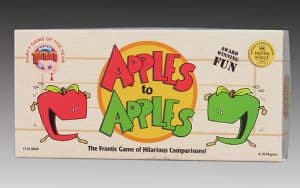It’s game night and my friends are gathered in my dining room. Four of them are face-down in a plateful of whipped cream, with their hands tied behind their backs, desperately trying to find snack-size candy bars hidden underneath. The rest of the group are laughing raucously, cheering their partners on. The goal of the first group to find and eat all five hidden snack-size candy bars is well on its way, and it looks like it’s coming down between my friend, James, and my wife, Kaytlyn. As James and Kaytlyn are frantically searching for the last candy bar, it looks like James has spotted it. He quickly grabs it with his teeth, and swallows it in record time. He won!
No, games such as this are no longer reserved just for children. In fact, on this particular night there wasn’t a child in sight—a testament to the universal appeal of games. Board games, party games, and card games all have the ability to bring adults together to play as they once did as children, providing a few hours of stress-free fun. 
Recently, with the success of party games such as Apples to Apples, adult game nights have become very popular. Matt Kirby created Apples to Apples after a lunch conversation with his in-laws where he asked, “Who was the better writer, F. Scott Fitzgerald or Hemingway?” This simple question made Kirby think about the patterns of comparisons, and, after tinkering with the idea of developing a board game, he eventually turned it into the very successful card game. Originally published by Out of the Box, it is now manufactured by Mattel, and has sold more than 14 million units.
For those who are looking for more, ahem, “adult” fun, Cards Against Humanity will most likely fit the bill. Initially a digital-only game, the creators raised funds in 2011 through a Kickstarter campaign. They raised four times as much as their goal and released the game to the public in 2012. Pitched as “a party game for horrible people,” the card game is similar to Apples to Apples in that players make comparisons. The comparisons, however, are often risqué and are not suitable to be repeated on this family-friendly blog post. Most likely not meant to be played with your family after Thanksgiving dinner, Cards Against Humanity is perfectly suited to an adult game night—provided that your friends are open-minded enough to handle the potentially tasteless jokes.
My own game night consisted of six couples, who were then separated into two teams. It was men vs. women. I discovered and selected the games after a few Google searches, and the games were divided into five rounds, with each round generating team points to be tallied at the end of the night. Like the aforementioned whipped cream game, most were silly and childish, yet certainly fun. There was, for example, the sticker game, where each player is handed a roll of stickers at the beginning of the night. As the evening progresses, players attempt to discreetly place their stickers on another person. If the player is caught in the act, one point is given to the person who caught him/her; but if the player is successful in covertly attaching the sticker, one point is awarded to his or her team. The women, it turned out, were much better at this game than the men. Not only did they think of the strategy of making a “sticker flower,” where multiple stickers were attached together, thus scoring more points with each pin, but they were also far better at stealthily placing the stickers while being fully engaged in conversation, so that the men never suspected any foul play.
These games were created on a budget, and required minimal supplies. With a bit of time and willingness to put a little thought into it, it’s easy to have fun-filled game nights that will delight even the most stoic of your friends. And if you are willing to spend some money, games like Apples to Apples and Cards Against Humanity (to just name a couple) will surely do the trick as well. So to those who are parents, kick your kids out of the house, invite some friends over, enjoy a night of games, and recapture a little of your carefree childhood.



